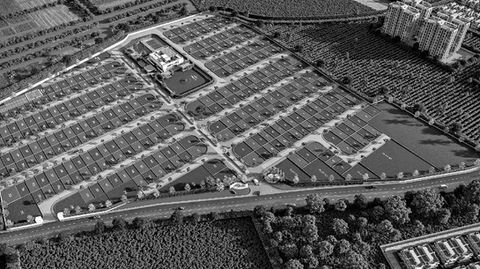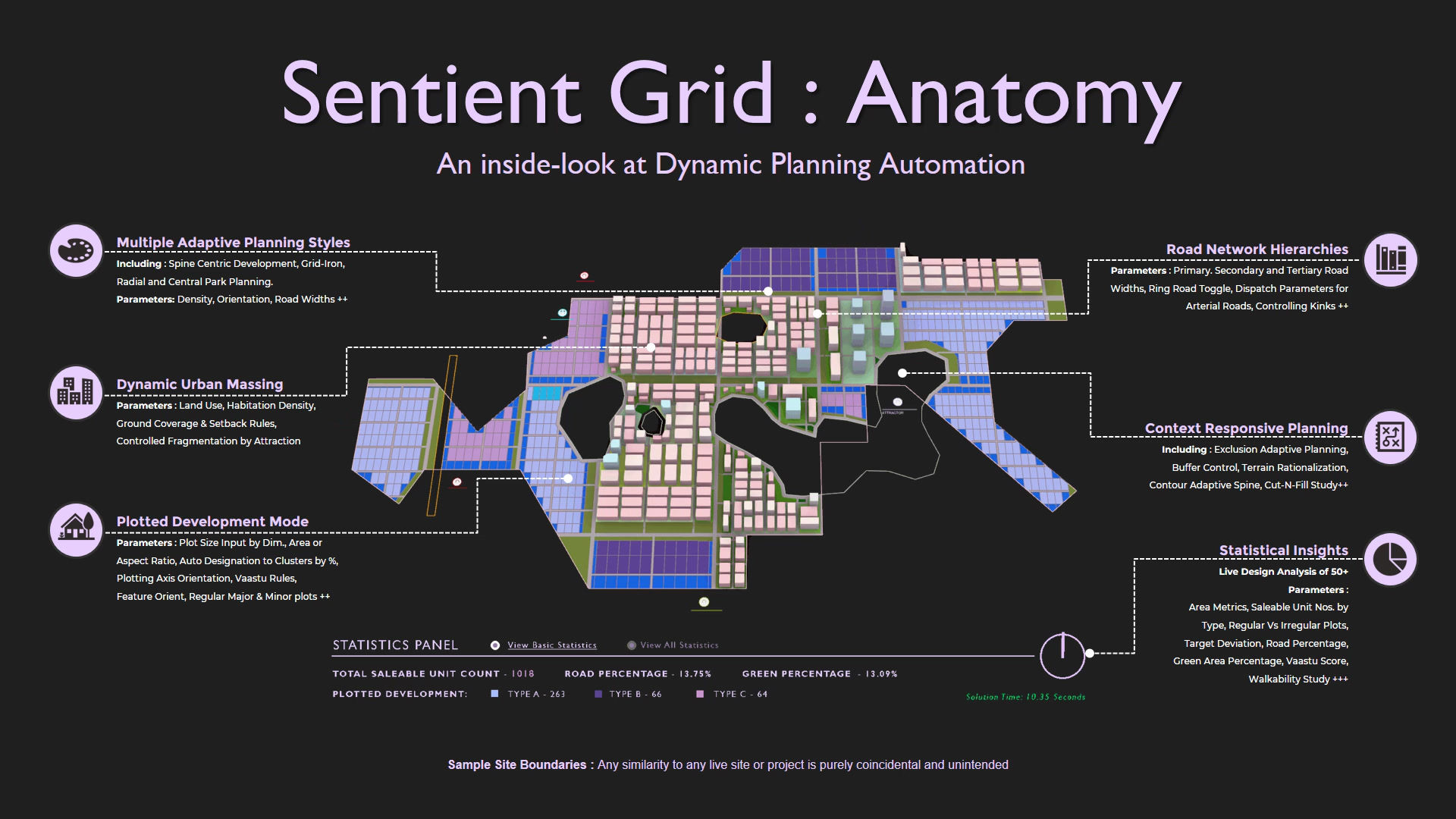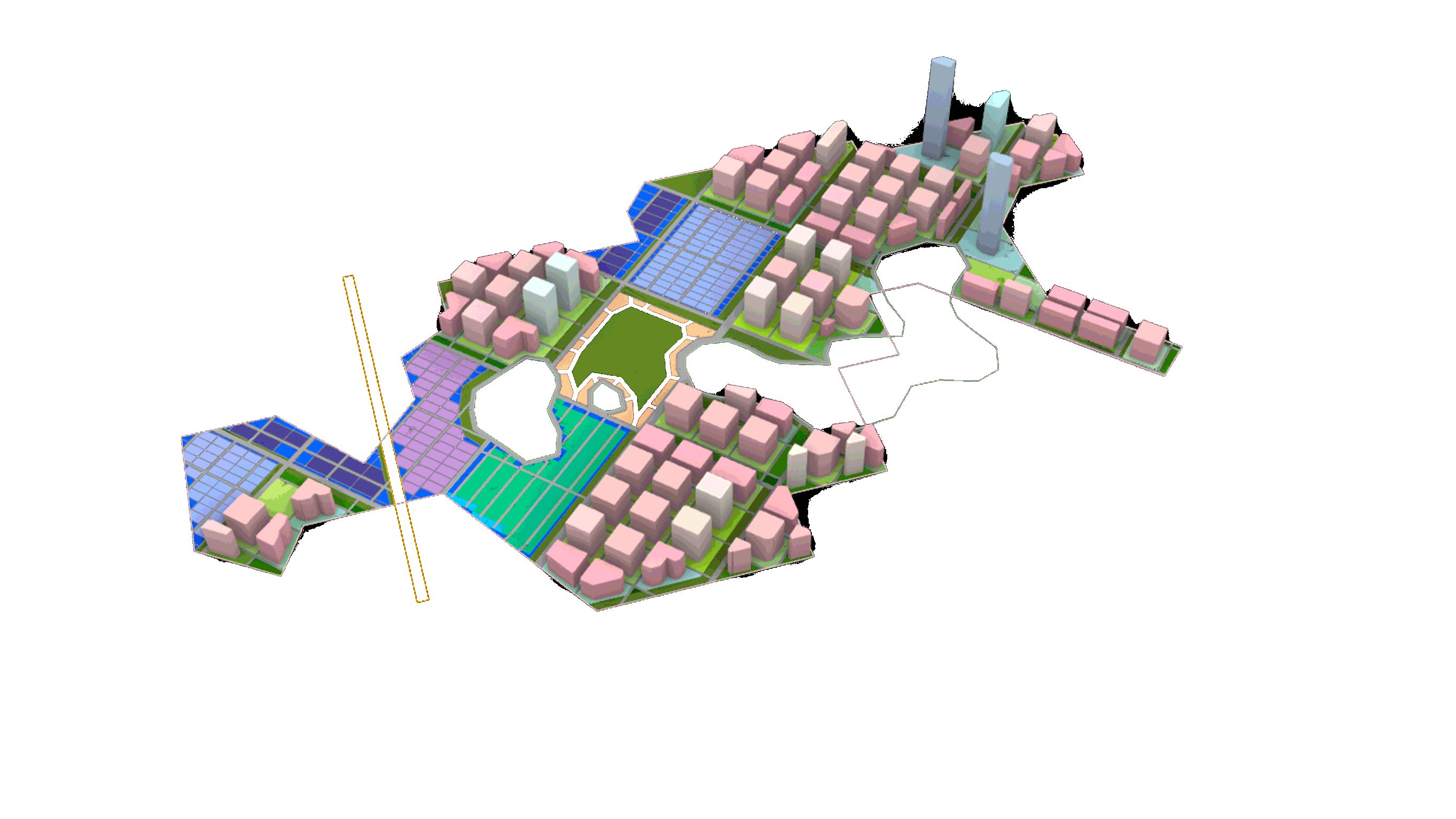

SCROLL TO EXPLORE


Interactive Automation in
Planning & Design.
Sentient Grid reduces Master-Planning timelines from Months to Minutes, promising radical transformation in Urban Design, Real Estate and AEC.
A heuristic algorithmic framework, encoded in architectural logics, planning intelligence & design intuition.
Sentient Grid is a Designer Driven Adaptive Master-Planning System. It combines the Designer-Driven Precision of Computer Aided Drawing with the Speed, Adaptability and Scalability of Generative & AI-Driven Automation Technologies - empowering architects to seamlessly balance efficiency, detail and speed in their approach to complex planning projects.





Design with Flexibility,
Plan with Precision,
Iterate with Speed.
Sentient Grid promises transformative benefits for Architects and
Urban Planners, Real Estate Developers & Government Agencies.
Sentient Grid empowers professionals across diverse fields—including urban planners, researchers, government agencies, architects, engineers, and real estate developers—by providing innovative tools for urban planning, design, and land management. Combining data-driven insights with creative adaptability, it accelerates decision-making, optimizes land use, and ensures alignment with regulatory and sustainability goals.
Urban planners benefit from refined multi-objective designs that streamline workflows and maximize land potential, while Government Agencies gain tools to test scenarios in real time, advancing green initiatives and expediting approvals.
Architects and engineers experience enhanced creative speed and seamless integration with existing tools, enabling rapid concept development and visualization. For real estate developers, Sentient Grid offers solutions that shorten project timelines, increase profitability, and adapt swiftly to evolving market demands. By bridging gaps across sectors, Sentient Grid fosters efficiency, innovation, and collaboration in a rapidly evolving landscape.
Applications in Master Planning - From Feasibility Analyses to Designed Layouts
How it Works :
Sentient Grid automates complex planning processes, while giving you complete control over every detail.
Modular Strategy Microbots, Dynamic Control Points & Logic Gates -
The innovative process architecture that drives Sentient Grid
Sentient Grid is a heuristic algorithmic system designed to bring precision, flexibility, and speed to urban and architectural planning. At its core, the system ensures that every facet of its output is mathematically controlled—parametric, precise, and meticulously measured. However, what sets Sentient Grid apart is its modular, non-linear structure.
The system is built around Microbots, independent strategy fragments that function autonomously yet are designed to be assembled in countless configurations. These Microbots can be linked in sequence, empowering users to tailor planning workflows to their specific needs and objectives. Whether it’s creating large-scale masterplans or refining intricate zoning strategies, users can design and execute solutions in a matter of seconds.
Zero-AI Solution: This modularity represents a radical departure from traditional CAD workflows, combining precision with the fluidity of a heuristic approach. Remarkably, Sentient Grid achieves results without any reliance on AI. It delivers the speed and adaptability often attributed to AI-powered visualization tools while surpassing them in accuracy, control, and the depth of its planning capabilities. Sentient Grid isn’t just an incremental improvement—it’s a paradigm shift in how we think about & execute planning. It redefines what’s possible, giving architects, urban planners, & developers a system that is as innovative as it is practical.
Adaptive Blueprints for Cities
Four Fully Parametric, Plug-n-Play Planning Styles
01
Spine Based Mode

Key Feature: Linear development along a central spine or corridor, birthing network hierarchies.
Best For: Transit-oriented cities or developments along highways, requiring linear growth patterns.
Examples: Chandigarh (sectoral spine), Brasília (Monumental Axis), Curitiba (transit corridors).
02
Grid Iron Mode

Key Feature: Uniform grid layout ensuring clarity and efficiency in planning at scale.
Best For: High-density urban precincts that require organized planning / expansion.
Examples: Manhattan (Blocks), Barcelona (Eixample district), Chicago (structured grid).
03
Central Park Mode

Key Feature: Large central green space as the city’s ecological and social core.
Best For: Injecting areas of dense urbanization with relief areas for environmental & social well-being.
Examples: Central Park (New York), Hyde Park (London), Lumphini Park (Bangkok).
04
Radial Mode

Key Feature: Centralized core with radiating connections, manifesting as spatial landmarks.
Best For: Cities with strong historical, cultural, or economic hubs.
Examples: Paris (radiating roads), Moscow (Kremlin-centric layout), Karlsruhe (fan-shaped design).
Did you know?


Interactive Automation in
Planning and Design
Sentient Grid reduces Master-Planning timelines from Months to Minutes, promising radical transformation in Urban Design, Real Estate and AEC.
Process Architecture
Sentient Grid is a computational framework,
encoded in architectural logics, planning intelligence & design intuition.
Sentient Grid is a Designer Driven Adaptive Master-Planning System.
Sentient Grid combines the Designer-Driven Precision of Computer Aided Drawing with the Speed, Adaptability and Scalability of Automated Technologies - empowering architects to seamlessly balance creativity, efficiency, detail and speed in their approach to planning. From data-driven insights to real-time customization, Sentient Grid lets you redefine how you approach planning—tailored to your vision, every time.

Design with Flexibility,
Plan with Precision,
Iterate with Speed.
Sentient Grid promises transformative benefits for Architects and Planners, Real Estate Developers & Government Agencies.
Sentient Grid empowers professionals across diverse fields—including urban planners, researchers, government agencies, architects, engineers, and real estate developers—by providing innovative tools for urban planning, design, and land management. Combining data-driven insights with creative adaptability, it accelerates decision-making, optimizes land use, and ensures alignment with regulatory and sustainability goals. Urban planners benefit from refined multi-objective designs that streamline workflows and maximize land potential, while Government Agencies gain tools to test scenarios in real time, advancing green initiatives and expediting approvals. Architects and engineers experience enhanced creative speed and seamless integration with existing tools, enabling rapid concept development and visualization. For real estate developers, Sentient Grid offers solutions that shorten project timelines, increase profitability, and adapt swiftly to evolving market demands. By bridging gaps across sectors, Sentient Grid fosters efficiency, innovation, and collaboration in a rapidly evolving landscape.
Applications in Master Planning : From Feasibility Analyses to Designed Layouts


How it works:
Sentient Grid automates complex planning processes, while allowing you complete control over every detail.
Strategy Microbots,
Dynamic Control Points & Logic Networks - The innovative process architecture that drives Sentient Grid
Sentient Grid is a heuristic algorithmic system designed to bring precision, flexibility, and speed to urban and architectural planning. At its core, the system ensures that every facet of its output is mathematically controlled—parametric, precise, and meticulously measured. However, what sets Sentient Grid apart is its modular, non-linear structure. The system is built around Microbots, independent strategy fragments that function autonomously yet are designed to be assembled in countless configurations. These Microbots can be linked in sequence, empowering users to tailor planning workflows to their specific needs and objectives. Whether it’s creating large-scale masterplans or refining intricate zoning strategies, users can design and execute solutions in a matter of seconds. This modularity represents a radical departure from traditional CAD workflows, combining unparalleled precision with the fluidity of a heuristic approach. Remarkably, Sentient Grid achieves all of this without relying on AI. It delivers the speed and adaptability often attributed to AI-powered visualization tools while surpassing them in accuracy, control, and the depth of its planning capabilities. Sentient Grid isn’t just an incremental improvement—it’s a paradigm shift in how we think about and execute planning. It redefines what’s possible, giving architects, urban planners, and developers a system that is as innovative as it is practical.

Legend :
1. Context Responsive Planning 2. Road Network Hierarchies
3. Dynamic Urban Massing 4. Land Use Exploration 5. Plotted Development Mode 6. Live Statistics
Blueprints for Cities:
Four fully parametric,
Plug-n-Play, Adaptive Planning Styles
01
Spine Based Mode

Key Feature: Linear development along a central spine or corridor, birthing network hierarchies.
Best For: Transit-oriented cities or developments along highways, requiring linear growth patterns.
Examples: Chandigarh (sectoral spine), Brasília (Monumental Axis), Curitiba (transit corridors).
02
Grid Iron Mode

Key Feature: Uniform grid layout ensuring clarity and efficiency in planning at scale.
Best For: High-density urban precincts that require organized planning / expansion.
Examples: Manhattan (Blocks), Barcelona (Eixample district), Chicago (structured grid).
03
Central Park Mode

Key Feature: Large central green space as the city’s ecological and social core.
Best For: Injecting areas of dense urbanization with relief areas for environmental & social well-being.
Examples: Central Park (New York), Hyde Park (London), Lumphini Park (Bangkok).
04
Radial Mode

Key Feature: Centralized core with radiating connections, manifesting as spatial landmarks.
Best For: Cities with strong historical, cultural, or economic hubs.
Examples: Paris (radiating roads), Moscow (Kremlin-centric layout), Karlsruhe (fan-shaped design).
Modular, Adaptive, Scalable: Microbot Architecture™
Parametric Process Models at the heart of Sentient Grid's functionality
Each Microbot is an independent mathematical 'bot' programmed to carry out a specific sequence of design operations required to achieve a larger Design Strategy or Goal - addressing diverse requirements that are typically encountered by an architect in different phases of design. Modular Microbots embody planning philosophies and best practices, seamlessly integrating strategy and design. Like LEGO sets, these versatile components can be reconfigured, and assembled on demand, empowering users to tailor workflows to their specific needs. Microbot Architecture paves the way for a groundbreaking concept: DIY Automation – a transformative approach to personalized and efficient design automation


Benefits of Strategy Modelling :
Modular, Adaptive, Scalable: Microbot Architecture™
Parametric Strategy Models at the heart of Sentient Grid's functionality
Each Microbot is an independent mathematical 'bot' programmed to carry out a specific sequence of design operations required to achieve a larger Design Strategy or Goal - addressing diverse requirements that are typically encountered by an architect in different phases of design.
Modular Microbots embody planning philosophies and best practices, seamlessly integrating strategy and design. Like LEGO sets, these versatile components can be reconfigured, and assembled on demand, empowering users to tailor workflows to their specific needs.
Microbot Architecture paves the way for a groundbreaking concept:
DIY Automation – a transformative approach to personalized and efficient design automation
Planning with Microbots : Strategy Sequences
Dynamic Planning with Control Points
Parametric City Gallery : Explorations



Dynamic Control Points


A shift to Strategy Modelling:
Combining the Designer-Driven Precision of Computer Aided Drawing with the Speed, Scalability & Adaptability of Automation Technologies.
Strategy modeling represents a transformative approach to design, blending the meticulous precision of traditional computer-aided drawing with the unmatched efficiency of automation. By prioritizing designer-driven control, this methodology enables creatives to maintain their unique vision while leveraging the speed, scalability, and adaptability of advanced technology.
The result is a workflow that empowers designers to achieve outcomes faster, handle complex scenarios effortlessly, and respond dynamically to changing project needs—all without compromising the intent and detail that make each project unique.
Planning Ahead :
A future-ready framework, designed to evolve
Sentient Grid establishes the foundations of a multi-technology ecosystem for Smart, Sustainable and better-planned future cities!
Sentient Grid’s adaptable architecture establishes the foundation for a future where diverse technologies converge seamlessly. Its modular, parameter-driven design is poised to evolve into a versatile framework capable of integrating live data streams, AI-driven insights, and virtual environments. By enabling these connections, Sentient Grid has the potential to act as a host ecosystem—adapting to advancements, expanding its capabilities, and fostering intelligent collaboration.
In the not-so-distant future, this framework could power a range of transformative applications. From enabling real-time integration with external data sources for smarter decision-making to generating precise datasets for advanced AI model training, Sentient Grid is built to support the next generation of planning tools. Its ability to bridge physical and digital domains also positions it as an essential framework for innovations like virtual land development in Web3.0 environments, creating a new paradigm of interconnected urban systems.
This forward-looking, technology-friendly approach ensures that Sentient Grid is not just a tool for today’s challenges but a foundation for tomorrow’s opportunities—modular, dynamic, and designed to grow alongside evolving needs.

Extended Integration with Live Data Sources
Simulate energy efficiency scenarios for urban layouts, achieving Sustainability Goals.
Programmatic recommendations based on land-use patterns and transit data.
Dynamic analysis of real-time contextual metadata (ex. Views, Climate, Urban Heat Island Effect, Walkability Metrics ++).

Dataset Generation for Focused AI Model Training
Generate exhaustive design permutation data tailored to specific rules and styles.
Facilitate training of proprietary AI systems with specialized, high-quality datasets.
Accelerate AI development for enterprises and agencies with focused objectives.

Virtual Land Development for Web3.0 Environments
Simulate scalable, spatially accurate digital assets (DAOs) for various metaverse platforms.
Enable interactive urban planning and architectural visualization in virtual ecosystems.
Bridge physical and virtual realms, offering new opportunities for stakeholder engagement.
Sentient Grid is now in Beta!
Sentient Grid is now in its beta phase! Be a part of the initiative and collaborate with our team on your next planning project.
Your feedback will help refine the system, with early adopters rewarded through significant future incentives, including priority onboarding and subscription advantages as we transition to full deployment.
For product demo & project inquiries write to us at:
For collaborations and investment related inquiries, drop a line to roy@mothership.co.in
Benefits of Strategy Modelling :

Intent-Centric Workflows
Beyond command-driven methods to strategy-driven design. Intent-centric workflows let you focus on high-level goals, using tools like parametric prompting and attractor points to achieve outcomes intuitively.
Data-Driven Design
Harness the power of analytical data directly derived from your designs. This feedback loop empowers continuous refinement and optimization, ensuring informed decisions at every stage.
Multi-Objective Optimization
Sentient Grid can be implemented as an genetic optimization algorithm which autonomously balances constraints and opportunities, ensuring optimized outcomes at every stage.
Real-Time Responsiveness
Achieve immediate feedback and adaptability in design. Real-time responsiveness enables dynamic adjustments to inputs, to refine outcomes instantly. This ensures faster decisions and more accurate results.
Microbot Strategy Sequences
Parametric City Gallery

A shift to
Strategy Modelling
Combining the Designer-Driven precision of Computer Aided Drawing with the Speed, Scalability & Adaptability of Automation Technologies
Strategy modeling represents a transformative approach to design, blending the meticulous precision of traditional computer-aided drawing with the unmatched efficiency of automation. By prioritizing designer-driven control, this methodology enables creatives to maintain their unique vision while leveraging the speed, scalability, and adaptability of advanced technology. The result is a workflow that empowers designers to achieve outcomes faster, handle complex scenarios effortlessly, and respond dynamically to changing project needs—all without compromising the intent and detail that make each project unique.
Benefits of Strategy Modelling :

Intent Centric Workflows
Beyond command-driven methods to strategy-driven design. Intent-centric workflows let you focus on high-level goals, using tools like parametric prompting and attractor points to achieve outcomes intuitively.
Data Driven Design
Harness the power of analytical data directly derived from your designs. This feedback loop empowers continuous refinement and optimization, ensuring informed decisions at every stage.
Objective Driven Optimization
Sentient Grid can be implemented as an genetic optimization algorithm which autonomously balances constraints and opportunities, ensuring optimized outcomes at every stage.
Real Time Responsiveness
Achieve immediate feedback and adaptability in design. Real-time responsiveness enables dynamic adjustments to inputs, to refine outcomes instantly. This ensures faster decisions and more accurate results.
Planning Ahead:
A future-ready framework, designed to evolve
Sentient Grid establishes the foundations of a multi-technology ecosystem for Smart, Sustainable and better-planned future cities
Sentient Grid’s adaptable architecture establishes the foundation for a future where diverse technologies converge seamlessly. Its modular, parameter-driven design is poised to evolve into a versatile framework capable of integrating live data streams, AI-driven insights, and virtual environments. By enabling these connections, Sentient Grid has the potential to act as a host ecosystem—adapting to advancements, expanding its capabilities, and fostering intelligent collaboration. In the not-so-distant future, this framework could power a range of transformative applications. From enabling real-time integration with external data sources for smarter decision-making to generating precise datasets for advanced AI model training, Sentient Grid is built to support the next generation of planning tools. Its ability to bridge physical and digital domains also positions it as an essential framework for innovations like virtual land development in Web3.0 environments, creating a new paradigm of interconnected urban systems. This forward-looking, technology-friendly approach ensures that Sentient Grid is not just a tool for today’s challenges but a foundation for tomorrow’s opportunities—modular, dynamic, and designed to grow alongside evolving needs.


Extended Integration with External & Live Data Sources
Simulate energy efficiency scenarios for urban layouts, achieving Sustainability Goals.
Programmatic recommendations based on land-use patterns and transit data.
Dynamic analysis of real-time contextual metadata (ex. Views, Climate, Urban Heat Island Effect, Walkability Metrics ++).

Dataset Generation for Focused AI Model Training
Generate exhaustive design permutation data tailored to specific rules and styles.
Facilitate training of proprietary AI systems with specialized, high-quality datasets.
Accelerate AI development for enterprises and agencies with focused objectives.

Virtual Land Development for Web3.0 Environments
Simulate scalable, spatially accurate digital assets (DAOs) for various metaverse platforms.
Enable interactive urban planning and architectural visualization in virtual ecosystems.
Bridge physical and virtual realms, offering new opportunities for stakeholder engagement.
Sentient Grid is now in Beta!
Sentient Grid is now in its beta phase! Be a part of the initiative and collaborate with our experts on your next project.
Your feedback will help refine the system, with early adopters rewarded through significant future incentives, including priority onboarding and subscription advantages as we transition to full deployment.
To book a consultation / inquiries, write to us at:

































